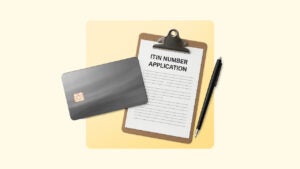How international students can get a credit card

Key takeaways
- International students can get credit cards, but you’ll likely need an ITIN or someone who’ll let you become an authorized user on their card. A U.S. bank account can help, too.
- If you’re under 21, you’ll need an adult co-signer or a way to prove you can repay your debts, like a part-time job.
- Some types of international student credit cards include student credit cards, secured credit cards and prepaid credit cards.
Understanding how to get a credit card can already be overwhelming, and the process can seem even more daunting as an international student. But you can get a credit card as an international student in the U.S. Some of the most common ways include getting an Individual Taxpayer Identification Number (ITIN) or Social Security number (SSN), opening a U.S. bank account or becoming an authorized user on someone else’s account.
Discover how you can get a credit card in the U.S., why it can be important and card options for international students.
Can international students get a credit card in the U.S.?
Yes, international students can get a credit card, though there are a number of factors that go into the process.
You can get a credit card in the U.S. if you are an international student. But when applying for a credit card, whether you’re an international student or not, most issuers will check your credit history. Most applications will also require an SSN, though some issuers will accept an ITIN or even a visa.
According to The Credit CARD Act of 2009, a major piece of credit card legislation in the U.S., you’ll also need to be at least 21 to be the primary holder of a line of credit unless you have an adult co-signer and can prove your ability to repay any debts (such as by securing employment).
While you should be able to use your native card in the U.S., you might incur foreign transaction fees depending on the card. Having access to credit is important for small conveniences, like making purchases when cash is not always handy, and it can be a key step in establishing yourself in the U.S. If you plan on staying in the U.S., building a positive credit history early can improve your chances for loans, and depending on the state, even your employment.
Challenges for international students
International students face a number of hurdles when seeking credit and credit-building opportunities in the U.S.
Chief among these is that the majority of credit card applications require an SSN or ITIN (with the former being more commonly accepted, especially. for online applications), so not many international students will be eligible. Plus, depending on which cards you apply for, having a limited U.S. credit history (or no credit) can make it difficult to get approved.
Here’s a closer look at some of these challenges:
- You can’t get an SSN. Attending school in the U.S. isn’t enough to make you eligible for an SSN. You’ll also need work authorization, which you may only be able to get via on-campus employment. In some circumstances, F-1 visa holders may be eligible for Curricular Practical Training, which allows students to do off-campus training or work in off-campus jobs and internships as long as they’re tied to the student’s academic program.
- You can’t get an ITIN. If you’re not eligible for an SSN or don’t have the documentation you need to apply for an SSN, an ITIN is a viable alternative. However, as the Internal Revenue Service (IRS) website notes, you’ll need a “valid tax reason for needing an ITIN,” such as filing a U.S. federal tax return or being a dependent or spouse of a U.S. citizen.
- Your income is too low. Even if you’re able to secure work authorization and an SSN or ITIN, you may not make enough to qualify for the credit cards you’re interested in. After all, many on-campus jobs and internships are part-time. That said, issuers typically allow you to count any money you can reliably access as income in your application, including loans or scholarship money designated for personal living expenses. Low income may also be less of a hindrance when applying for secured cards.
- You don’t have U.S. credit history. The vast majority of credit card applications require at least a soft credit check — even cards designed for people with bad credit or no credit history. Without U.S. credit history, it will be especially difficult to qualify for rewards cards (which typically require a good-to-excellent credit score) and unsecured credit cards (which carry heavier risk for lenders).
3 tips for getting a credit card as an international student
You’ll need to prove your creditworthiness to up your approval odds.
As an international student applying for a credit card, you may need different application materials, including your student visa, ITIN and unexpired identification. Plus, you still need to prove yourself as creditworthy, so here are a few more tips:
- Open a U.S. bank account: A big part of getting approved for a credit card is proving you have a source of income. Establishing a monetary base in the U.S. by opening a checking account is a positive signal to lenders. And it may be easier to apply for a credit card issued by the bank with which you open an account — the established financial relationship works in your favor and your chances for approval may be higher.
- Establish credit with new credit reporting tools: Once you have a U.S. bank account, you can use tools like UltraFICO™ and Experian Boost to report positive account activity to credit bureaus — like utility bills, subscriptions and rent payments — which can help boost your credit score.
- Get a part-time job: Depending on your student visa, you may be able to secure part-time employment, which will qualify you for an SSN and serve as your proof of income for getting a credit card as an international student.
How to get a credit card for international students
How you get a credit card will depend on whether or not you have an SSN.
The process for getting a card will look different depending on if you have an SSN. Check out how to apply for a credit card if you have an SSN and if you don’t have one.
Getting a credit card for international students with an SSN
If you already have an SSN, then you can apply for a card as usual. Simply list it on your application along with other standard requirements, such as income and credit history.
Getting a credit card for international students without an SSN
Though most credit card applications will require an SSN, there are different ways you can gain access to credit without one. Most notably, you can request an ITIN.
- Request an ITIN. Some credit card issuers will accept this number for a credit card application if you do not have an SSN. You can request an ITIN through the Internal Revenue Service (IRS).
- Become an authorized user. If you know someone who is willing to let you become an authorized user on their card, you’ll then have access to credit this way. Your primary cardholder should understand that they are chiefly responsible for any debts you accrue.
-
Look for cards that don’t require an SSN. While rare, some cards don’t require an SSN and may only need your passport or other alternative ID for the application.
Card options for international students
Secured cards and debit cards are just some of the choices available for international students.
As an international student, you have options when it comes to applying for a credit card. Some of the most common are the following:
The bottom line
It may take some work, but you can access credit cards as an international student. Alternative forms of identification like ITINs, passports and visas can help. International students can open a U.S. bank account, sign up for a prepaid card or become an authorized user on someone else’s card. With a few solid workarounds, there’s a way for most people to access these credit-building tools.
Why we ask for feedback Your feedback helps us improve our content and services. It takes less than a minute to complete.
Your responses are anonymous and will only be used for improving our website.






